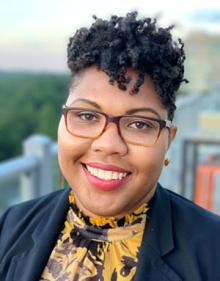
Niteace Whittington, Ph.D., was approaching the fourth year of her NINDS postdoctoral fellowship when she began feeling burnt out at the bench. While she enjoyed studying neural development in embryonic mice, Dr. Whittington wanted to explore careers outside of the lab too. With helpful support from her advisor, Susan Wray, Ph.D., Senior Investigator in the Cellular and Developmental Neurobiology Section, Dr. Whittington decided to pursue a part-time detail working in science education and outreach, while remaining in the lab. During that time, she attended a workshop on science policy at NIH. Dr. Whittington realized that she could use her science communication skills to translate scientific research for many audiences, including policy decision makers. The workshop inspired her to apply for the AAAS Science and Technology Policy Fellowship, which led to her current position as a health science policy analyst at the Eunice Kennedy Shriver National Institute of Child Health and Human Development (NICHD).
Read on to find out more about Dr. Whittington’s science policy career and her advice to NINDS trainees who are interested in this type of work.
What is a day (or week) like in the life of a Health Science Policy Analyst?
I am currently a Lead Health Science Policy Analyst in the Science Policy, Planning and Evaluation Branch in the Office of Science Policy, Reporting, and Program Analysis. Our team prepares reports on NICHD's activities and their impact on science and public health and provides information to requesters within the NIH, DHHS, Congress, the White House, and other federal agencies. We are often called to rapidly respond to inquiries on policies, programs, plans, research accomplishments, and other activities regarding scientific initiatives and advances generated by NICHD research programs. We also develop, maintain, and rigorously analyze detailed data on NICHD's programs and their impact to identify scientific advances and new opportunities for research. My work is a combination of preparing materials and contributing to recurring and ad hoc data requests and reports.
What do you like most about your work, and what do you find the most challenging?
I have always enjoyed “translating the science” and explaining complex and technical information about biomedical research to non-scientific audiences. I’ve done this inside and outside of the lab, and I think it is a very important skill to have. I like helping people to understand why we fund the research that we do.
NICHD funds such a broad and interesting portfolio of research, which is what initially drew me to the Institute—in addition to my background in developmental biology and my desire to move away from the bench without losing my connection to science. I enjoy writing and translating science, and this position has allowed me to do just that. The most challenging aspect of my work is that we sometimes receive requests with very little turnaround time, which can be stressful when coordinating a rapid response across several people.
What skills, abilities, and personal attributes are essential to success in your position, and how did you grow those skills as an NINDS trainee?
Science communication skills are essential for my position. I developed my writing and presentation skills over the course of my graduate and postdoctoral training by writing and presenting my research for a variety of audiences, ranging from high school students to faculty and scientific society members. During my postdoctoral fellowship at NINDS, our lab members met weekly and rotated presenting our data. We also presented our research at regional and national scientific conferences and wrote manuscripts of our research findings. I mentored high school and postbac students in the lab, and I participated in several outreach efforts describing my research and experience to encourage students in science. Project management skills and working well with a team are additional skills that I developed during my postdoctoral fellowship and are beneficial for my current position.
What advice would you give to current or prospective NINDS trainees who are interested in science policy?
I highly recommend the AAAS Science and Technology Policy Fellowship, which provides opportunities for scientists and engineers to learn first-hand about federal policymaking. The fellowship was one of the greatest experiences I’ve had professionally. It gave me a great opportunity to not only expand my network but also to see a completely different side of NIH outside of the lab. I witnessed how evidence-based decisions are made, and how these decisions affect the research that we support.
I would also suggest talking to other people who are involved in different aspects of science policy that you find interesting. Informational interviews were a big part of my AAAS policy fellowship, and they helped me understand what was out there, and what I may or may not like. I recommend finding a mentor and forming a support network. Everyone is different, and everyone takes different paths to get where they are going. Don’t be afraid to take a different path or make a new one. Don’t be afraid to try something new, even if it’s not what you originally thought you’d be doing. And always listen to yourself and take care of yourself mentally as well as physically.
Contributed by Shana R. Spindler, Ph.D., freelance science writer and former NIH postdoctoral fellow.
